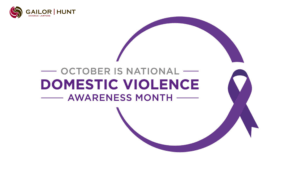
October marks Domestic Violence Awareness Month, a time to center attention on the silent struggles many endure behind closed doors. In the Triangle region and across North Carolina, this observance is not just symbolic—it’s a reminder that awareness, resources, and action can help save lives and protect futures.
Domestic violence is not confined to any single socioeconomic group, profession, or “type” of
household. It can begin with small acts of control, escalate to emotional or physical abuse, and
eventually become life-threatening. Unfortunately, victims often feel trapped by fear, shame, or uncertainty about where to turn.
Some warning signs may include:
If any of these resonate with you or someone you care about, please know that help is
available—and the situation is not hopeless.
North Carolina law provides a variety of tools intended to protect survivors and hold abusers
accountable. Some of the legal options include:
Even when abuse overlaps with family law (divorce, child custody, property), the legal system offers mechanisms to preserve safety and equity. Having experienced counsel who understands both domestic violence and family law is crucial in such intertwined cases.
If you or someone you know is in crisis, the following numbers operate 24/7 and can connect you with local support and shelter options:
If you are in immediate danger, always call 911 first.
In households with greater financial or social capital, abuse can manifest in sophisticated or less visible ways—through corporate power dynamics, reputation control, leveraging private financial tools, or covert digital surveillance. Survivors may worry that coming forward will threaten their standing, exposure, or professional life. Yet, abuse is never justified by status. Legal remedies and protective support must be accessible to every individual, regardless of background.
If you believe you (or someone you care about) may be experiencing domestic abuse, consider
1. Prioritize safety first
Discreetly document evidence (photos, texts, emails). Keep emergency contacts and a packed bag hidden. Use safe devices and accounts when possible.
2. Reach out to crisis hotlines or local advocacy services
They can help with immediate steps, safety planning, and connecting you to shelter, counsel, or resources.
3. Seek legal counsel experienced in both family law and domestic violence
Protection orders, divorce strategies, child custody, asset division—all may intersect.
4. Once safe, move forward with a thoughtful strategy
Divorce or separation is not about “ending” but about beginning a safer, more stable
chapter for you and your children.
Confidentiality and discretion are fundamental. At Gailor, Hunt, Davis, Taylor & Gibbs, we treat every call and consultation with the utmost sensitivity. If you reach out, your information is protected, and you will have the space to assess your options without pressure.
If you are ready to talk—not because you’re forced to, but because you’re seeking a path forward—we are here. Whether it’s an exploratory conversation or a full strategic plan, you don’t have to navigate this alone. Call our firm at (919) 832-8488 to schedule a confidential consultation.